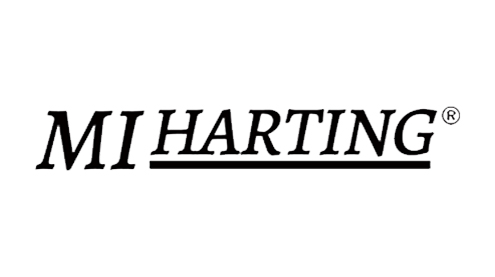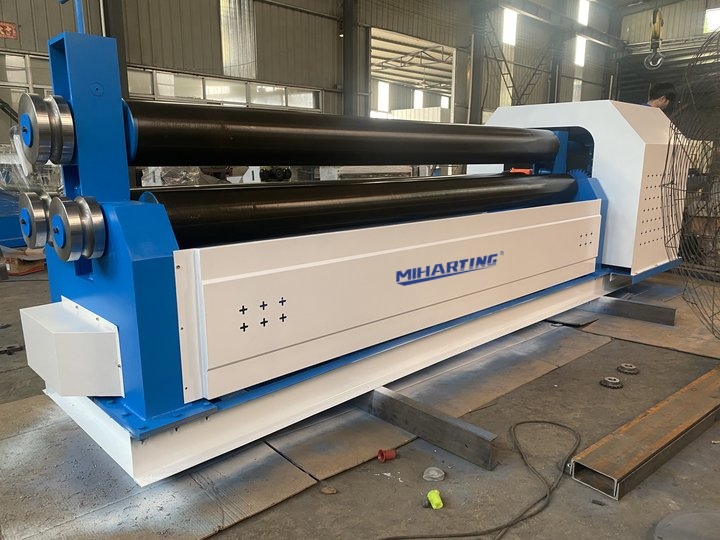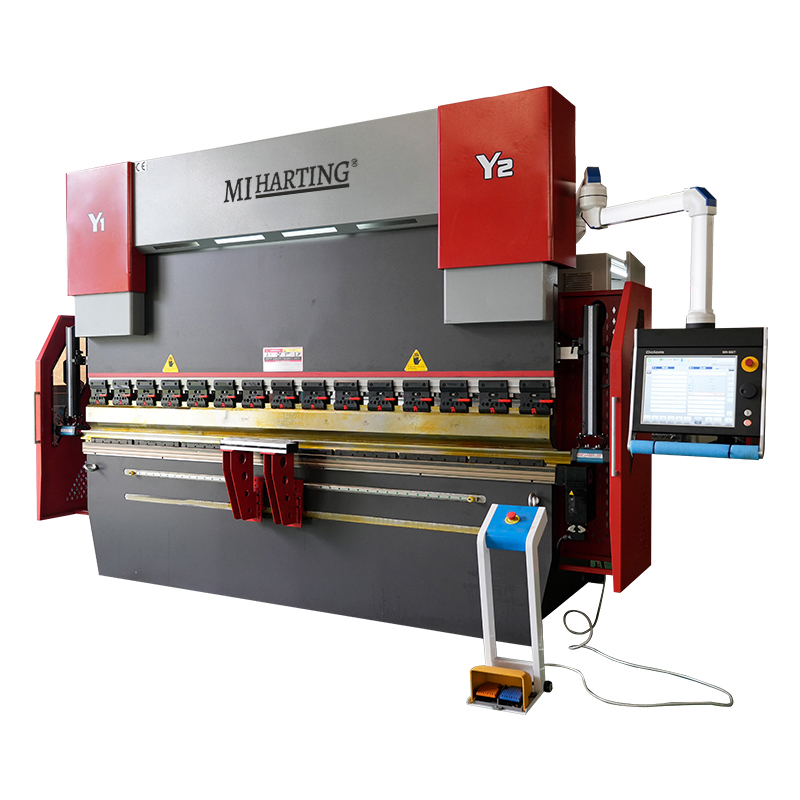En la fabricación moderna, las prensas plegadoras, como equipo indispensable e importante en el procesamiento de metales, se utilizan ampliamente en muchos campos, como automóviles, construcción y electrodomésticos. Las prensas plegadoras se dividen principalmente en dos tipos: prensas plegadoras mecánicas y prensas plegadoras. plegadora hidraulica Según sus fuentes de alimentación. Entonces, ¿cuál es mejor, una prensa plegadora mecánica o una hidráulica? A continuación, analizaremos estos dos dispositivos en detalle.
Ventajas y ámbito de aplicación de la prensa plegadora mecánica
La prensa plegadora mecánica adopta el principio de transmisión mecánica. El sistema de transmisión es accionado por un motor eléctrico que transmite potencia a las piezas mecánicas para generar una presión fija, lo que permite el doblado de chapas metálicas. Presenta una estructura simple y un funcionamiento cómodo, y es ideal para la producción en masa y el procesamiento de chapas metálicas de grosor medio y ligero.
Velocidad y eficiencia
La prensa plegadora mecánica presenta una estructura relativamente simple y una alta eficiencia de trabajo, especialmente en la producción en masa, lo que garantiza una mayor velocidad de producción. Para el procesamiento de chapas metálicas ligeras y delgadas, la prensa plegadora mecánica puede completar el plegado en poco tiempo, mejorando considerablemente la eficiencia de producción.
Precisión y estabilidad
La prensa plegadora mecánica ofrece alta precisión, especialmente en el plegado convencional, donde su exactitud está garantizada. Además, gracias a su estructura mecánica relativamente simple, el proceso de plegado es muy estable, lo que garantiza la calidad y precisión de cada proceso.
Aplicabilidad
Sin embargo, la prensa plegadora mecánica no es adecuada para el procesamiento de placas gruesas, y su efecto de plegado es relativamente limitado para placas de metal más duras y gruesas. Por lo tanto, la prensa plegadora mecánica es más adecuada para procesar placas delgadas y de espesor medio.
Ventajas y ámbito de aplicación de la prensa plegadora hidráulica
La prensa plegadora hidráulica utiliza el sistema hidráulico para generar presión e impulsa la matriz superior a través del cilindro hidráulico para realizar operaciones de plegado. El sistema hidráulico ofrece gran flexibilidad y capacidad de ajuste. Por lo tanto, la prensa plegadora hidráulica puede manipular diversas placas metálicas de diferentes espesores y durezas, y tiene una amplia gama de aplicaciones.
Amplia aplicabilidad
Una ventaja importante de la prensa plegadora hidráulica es su facilidad para procesar diferentes tipos de placas metálicas, tanto delgadas como gruesas. Además, la presión del sistema hidráulico se puede ajustar con precisión según los requisitos de las diferentes placas para garantizar la precisión y la calidad de cada procesamiento.
Alta precisión y alta flexibilidad.
Prensa plegadora hidráulica CNC Permite realizar operaciones de doblado con mayor precisión, especialmente al procesar formas complejas o piezas que requieren alta precisión. Permite ajustar la presión y el ángulo de doblado según las diferentes necesidades de trabajo, ofreciendo mayor flexibilidad.
Alto costo
Si bien la prensa plegadora hidráulica ofrece funciones más completas y mayor precisión, el costo del equipo en sí es mayor que el de la prensa plegadora mecánica, y el costo de mantenimiento también es relativamente alto. Para las empresas, es importante considerar la inversión inicial y los costos operativos posteriores de la prensa plegadora hidráulica.
Comparación completa entre prensa plegadora mecánica y prensa plegadora hidráulica
Precisión y estabilidad
Las prensas plegadoras mecánicas ofrecen alta estabilidad y precisión en circunstancias normales, y son adecuadas para la producción y el procesamiento a gran escala. Las prensas plegadoras hidráulicas pueden proporcionar resultados de plegado más precisos al procesar productos complejos o de alta precisión, especialmente para placas gruesas o productos con requisitos más exigentes. Las ventajas de la prensa plegadora hidráulica son más evidentes.
Ámbito de aplicación
Las prensas plegadoras mecánicas son adecuadas para placas metálicas ligeras, y su efecto de plegado para placas delgadas es ideal. La prensa plegadora hidráulica tiene un rango de aplicación más amplio. No solo puede procesar placas delgadas, sino también placas más gruesas y duras. Por lo tanto, su campo de aplicación es más amplio, especialmente cuando se requiere un procesamiento diversificado, donde las ventajas de la prensa plegadora hidráulica son más evidentes.
Costo de inversión
En términos de costo de inversión, las prensas plegadoras mecánicas tienen un costo inicial menor y, gracias a su estructura simple, el costo de reparación y mantenimiento también es bajo, lo que las hace ideales para pequeñas empresas con presupuestos limitados. Sin embargo, el costo de las prensas plegadoras hidráulicas es mayor, pero su estabilidad y versatilidad a largo plazo pueden brindar mayores beneficios a las empresas.
Conclusión
Tanto la prensa plegadora mecánica como la hidráulica ofrecen diferentes ventajas. El equipo a elegir debe determinarse según las necesidades reales de la empresa. Si trabaja principalmente con placas ligeras y delgadas y tiene altos requisitos de velocidad de producción, la prensa plegadora mecánica es, sin duda, la mejor opción. Si sus necesidades de procesamiento son más complejas y requieren un procesamiento diversificado y de alta precisión, especialmente el procesamiento de placas gruesas, prensa plegadora hidráulica de alta flexibilidad son una opción más adecuada.
Independientemente de la prensa plegadora que elija, debe evaluarla según sus requisitos de producción y presupuesto. Elegir la prensa plegadora que mejor se adapte a las necesidades de su empresa no solo puede mejorar la eficiencia de producción, sino también generar mayores beneficios a largo plazo.






